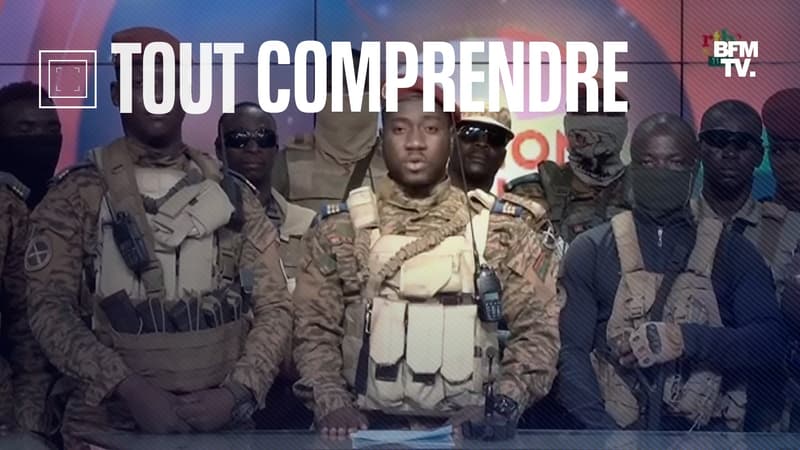Second military coup in less than a year in Burkina Faso. The West African country has seen a significant deterioration in its security situation for several years. The resurgence of the terrorist threat plays a role in this political instability, but also in the anti-French sentiment that the country has known for several years.
• What happened this weekend in Burkina Faso?
The soldiers announced on Friday night that they had sacked the head of the junta, Paul-Henri Sandaogo Damiba, to replace him with a young 34-year-old captain, Ibrahim Traoré.
Invoking the “continuous deterioration of the security situation” in the country, the military announced the closure of the borders, the suspension of the Constitution and the dissolution of the government and the Transitional Legislative Assembly. A curfew has also been established from 9 p.m. to 5 a.m.
Paul-Henri Sandaogo Damiba initially refused to abdicate. The situation was tense on Friday and Saturday, with shootings in the presidency district in Ouagadougou in particular. Damiba finally agreed to resign on Sunday, before taking refuge in Togo.
• Why is France criticized?
This weekend was marked by demonstrations against Damiba, but also against French institutions. Rumors circulated on social media that France had granted protection to the fallen leader, in particular by receiving him at his embassy. These claims have been formally denied by the French Foreign Ministry and Damiba himself.
Anti-Damiba protesters attacked some French buildings, such as the French Institute in Ouagadougou. The Minister of Foreign Affairs, Catherine Colonna, denounced on Sunday in RFI “violence” and “intrusion attempts” committed against the French Embassy.
France increased its military support to Burkina Faso in 2018, at the country’s request. the workgroup Saber, a French special forces unit, is stationed in Ouagadougou, the country’s capital.
This military cooperation did not prevent anti-French sentiment from flourishing in the country. This feeling, moreover, is not recent: a information report of the Senate already mentioned it in 2019. It is also not specific to Burkina Faso. Mali, a neighboring country, has also experienced various anti-French demonstrations in recent years, in a degraded security context.
• What are the links between Burkina Faso and Russia?
The protesters chanted anti-French slogans and waved Russian flags, demanding military cooperation with the country. This desire for rapprochement can be explained in several ways. A report by the Center for Analysis, Forecasting and Strategy (CAPS), attached to the Ministry of Foreign Affairs, and the Institute for Strategic Research of the Military School (IRSEM), already pointed out in 2018 a growing spread of Russian content on the African continent. Web.
He explained in particular this Russian news influence by the “great popularity of the anti-Western speeches propagated by the main Russian international media (RT and Sputnik)”.
These speeches speak of “African public opinion that often views Russia through the prism of its anti-colonial Soviet past”.
In fact, the report considered that several signs indicated that “Africa could be the next playing field of the Russian ‘information warfare'”.
If some Burkinabe call for a rapprochement with Russia, it is also because it has already taken place in the neighboring country. Mali has called on the Russian paramilitary group Wagner to fight the jihadists, despite accusations of abuse against civilians.
The Malian government is seeking to forge other military alliances as, “despite the deployment of UN, French and African forces, the violence that began in the north in 2012 gradually spread to the center of the country and then to neighboring countries ( Burkina Faso, Ivory Coast, Niger)”, explains the Jean Jaurès Foundation in a February publication.
“France, therefore, pays for its ‘lack of results’ in a military operation that lasts and whose effects civilians take time to perceive,” estimates the think tank.
• How to explain this political instability?
Like anti-French sentiment, political instability is particularly related to insecurity in the country. The country has suffered attacks by jihadist terrorist groups since 2015 and the year 2021 has been marked by a “clear deterioration” of the security situation in Burkina Faso, according to the NGO Human Rights Watch.
These attacks by armed groups allied with al-Qaeda and the Islamic State in the Greater Sahara killed more than 350 civilians in 2021, according to Human Rights Watch. The NGO points out that the attacks and the presence of terrorist groups have also spread geographically.
Lieutenant Colonel Damiba himself came to power on January 24 in a coup that overthrew President Roch Marc Christian Kaboré, accused of ineffectiveness in the fight against jihadist violence. Damiba had made a commitment to the Economic Community of West African States (ECOWAS) on organizing elections and returning civilians to power by July 2024.
Once again, the new head of the junta has promised to stop “the continuing deterioration of the security situation.” He also said that he wanted to honor his predecessor’s commitments to ECOWAS. A delegation from the organization was also scheduled to travel to Burkina Faso on Monday, but the visit was postponed to Tuesday for “logistical reasons,” according to ECOWAS.
Source: BFM TV


